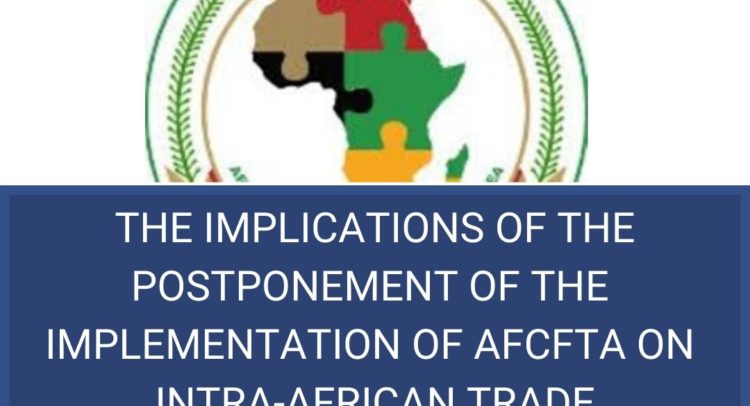The Implications of the Postponement of the Implementation of the African Continental Free Trade Area (AfCFTA) Agreement on Intra-African Trade
- Overview
As the COVID-19 pandemic continues to impact lives, trade and businesses all over the world, the African Continental Free Trade Area (AfCFTA) Secretary-General, Wemkele Mene recently announced the postponement of the commencement of trade under the AfCFTA. Commencement of trading under the AfCFTA was initially slated for 1 July 2020 (AfCFTA Trading Date). With no new AfCFTA Trading Date announced, it is important to consider what the postponement means for Africa in light of the pandemic and the objectives of the AfCFTA.
- What the Postponement of the AfCFTA Trading Date means for Africa
The rise in of COVID-19 cases across the African continent and the attendant effect of the pandemic on African trade and economy has become a major consideration for the implementation of the AfCFTA. As the AfCFTA Trading Date drew nearer and with the African Union unable to meet early in May due to restrictions and lockdown measures implemented across the continent, the postponement of the AfCFTA Trading Date was inevitable. However, postponing the commencement of trading under the AfCFTA is not without its implications some of which may not be obvious in the short term. Some of these implications are discussed below.
- Positive Opportunities from the Postponement of the AfCFTA Trading Date
Extended Time to Negotiate the Removal of Physical Trade and Non-tariff Barriers
On a positive note, the postponement of the commencement trading date under the AfCFTA grants African leaders the opportunity to continue discussions on the modalities and subsequently reach agreements on how best to remove physical trade and non-tariff barriers, two factors that are observable hurdles to the successful implementation of the AfCFTA.
Opportunity to Develop Local Capacity in Essential Goods and Services
Despite the imposition of partial or total lockdowns in African countries by their leaders, recent trends have revealed that the trade in essential goods and services continues almost unperturbed. The postponement of the AfCFTA Trading Date gives African countries the opportunity to enact policies and make available stimulus packages and tax incentives to enable geometric growth in that sector, in preparation for international trade in essential goods and services when the AfCFTA commences trade.
Opportunity to implement trade and investment policies and invest in critical infrastructure to accelerate investment
Countries with no or insufficient critical infrastructure to accelerate investment and attract investors, may be disadvantaged in the new dispensation of a unified African market. Countries with well-developed critical infrastructure will benefit most. The postponement of the AfCFTA Trading Date is a good opportunity for the countries without the necessary critical infrastructure to implement policies to spur growth in the necessary sectors.
- Negative Concerns Surrounding the Postponement of the AfCFTA Trading Date
Continued Trade with China
China is currently Africa’s major trading partner. Although, trade between China and Africa fell by 14% to $41 billion in the first quarter of 2020 compared to the same period in 2019 due to the COVID 19 pandemic, according to figures from China’s General Administration of Customs, postponing the AfCFTA Trading Date means that China will continue to be Africa’s major trading partner until a new trading date is agreed and trading commences under the AfCFTA.
Lack of urgency to ratify the AfCFTA Agreement
There appears to be some seeming reluctance on the part of certain African countries to ratify the AfCFTA Agreement. As at December 2019, only 30 of the 54 African countries which signed the AfCFTA Agreement, had ratified same. Some countries with significant markets, like Nigeria, delayed signing the AfCFTA treaty and have exercised no urgency in ratifying the treaty. This postponement of AfCFTA Trading Date may be an excuse for countries with similar trade agenda as Nigeria to continue to delay ratifying the treaty. Please see our previous article on the implications of failure to ratify the AfCFTA here.
Protectionism as the new order of the day
The partial or total lockdown by African countries as a responsive strategy to the COVID-19 pandemic means that intra-African trade remains low by comparison with other regions. Nigeria has had its borders shut since October 2019 as part of its efforts to tackle smuggling and spur the growth of the domestic agricultural industry. With the postponement of the AfCFTA Trading Date, Nigeria, a country with an important role in intra-African trade, may see no urgent need to reverse its protectionist policy.
- Conclusion
The movement restrictions occasioned by the COVID-19 pandemic, has made the postponement of the commencement of trade under the AfCFTA inevitable. African countries should consider the positive and negative considerations discussed above as negotiations continue toward the new trade commencement date, as the benefits of a successful implementation of the AfCFTA outweigh the disadvantages.
Please access the downloadable version here.



Comments are closed